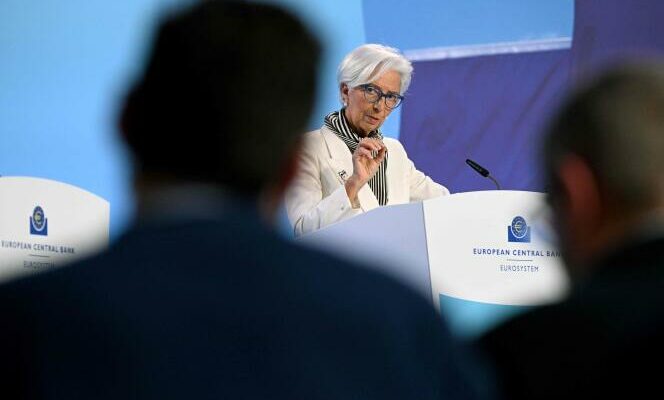Before time, it’s not time. During her press conference on Thursday January 25, Christine Lagarde, the president of the European Central Bank (ECB), repeated it several times: the board of governors, meeting a little earlier, considers that it is “premature” to debate lowering rates. Enough to disappoint those, among investors, who were hoping that the institution would give some clues about its future schedule. Especially since the week of January 15, during the World Economic Forum in Davos (Switzerland), Ms. Lagarde suggested that a reduction in rates in the summer was ” likely ” …
Faced with insistent questions on the subject, the Frenchwoman insisted on the fact that the ECB was “data dependent”. Understand: it will rely solely on the data, meeting after meeting, to decide whether or not to review the level of these rates. Starting with the indicators allowing inflation to be assessed. But also, and above all, those concerning the labor market, such as the result of sectoral wage negotiations in Germany and Italy during the first quarter, or the unemployment rate, which remains low (6.4% in November 2023). in the eurozone).
If wages are at the heart of its concerns, it is because they are decisive in the dynamics of so-called “domestic” inflation, namely that which does not depend on the prices of imported products, such as energy. However, in December, inflation excluding energy still stood at 4%, far from the ECB’s target of 2%. Taking into account electricity and gasoline prices, it was 2.9%. This is why, on Thursday, the monetary institute maintained its deposit rate, which determines the cost of credit to households and businesses, at 4%.
The level of bankruptcies is rising
“The most likely is that the ECB decides to lower it in the second quarter, because even if it is waiting for data confirming that wage growth is slowing, the economic outlook has also deteriorated”explains Jack Allen-Reynolds, at Capital Economics.
In addition to the geopolitical tensions weighing on the morale of households and businesses and the inflation which is weighing on consumption, the effects of the rise in rates continue to spread throughout the economy. Demand for new loans in the euro zone has plunged, approaching 2009 levels. Many companies are struggling to refinance themselves. The level of bankruptcies is rising. “The engines of European growth are at a standstill”summarize the economists at Oxford Economics, citing in particular the weaknesses in the industry.
You have 45% of this article left to read. The rest is reserved for subscribers.
